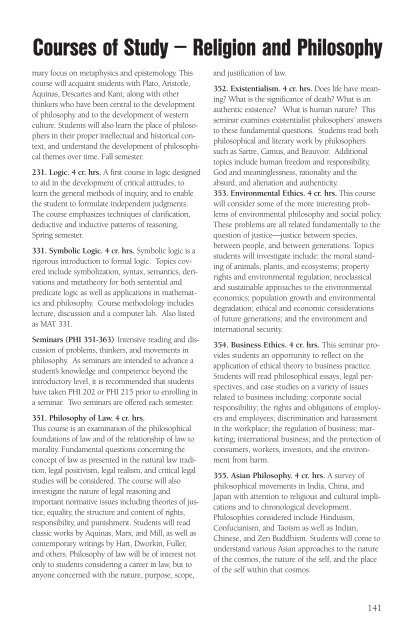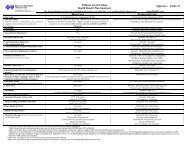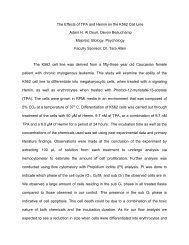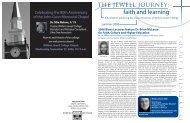Courses of Study - William Jewell College
Courses of Study - William Jewell College
Courses of Study - William Jewell College
You also want an ePaper? Increase the reach of your titles
YUMPU automatically turns print PDFs into web optimized ePapers that Google loves.
<strong>Courses</strong> <strong>of</strong> <strong>Study</strong> – Religion and Philosophy<br />
mary focus on metaphysics and epistemology. This<br />
course will acquaint students with Plato, Aristotle,<br />
Aquinas, Descartes and Kant, along with other<br />
thinkers who have been central to the development<br />
<strong>of</strong> philosophy and to the development <strong>of</strong> western<br />
culture. Students will also learn the place <strong>of</strong> philosophers<br />
in their proper intellectual and historical context,<br />
and understand the development <strong>of</strong> philosophical<br />
themes over time. Fall semester.<br />
231. Logic. 4 cr. hrs. A first course in logic designed<br />
to aid in the development <strong>of</strong> critical attitudes, to<br />
learn the general methods <strong>of</strong> inquiry, and to enable<br />
the student to formulate independent judgments.<br />
The course emphasizes techniques <strong>of</strong> clarification,<br />
deductive and inductive patterns <strong>of</strong> reasoning.<br />
Spring semester.<br />
331. Symbolic Logic. 4 cr. hrs. Symbolic logic is a<br />
rigorous introduction to formal logic. Topics covered<br />
include symbolization, syntax, semantics, derivations<br />
and metatheory for both sentential and<br />
predicate logic as well as applications in mathematics<br />
and philosophy. Course methodology includes<br />
lecture, discussion and a computer lab. Also listed<br />
as MAT 331.<br />
Seminars (PHI 351-363) Intensive reading and discussion<br />
<strong>of</strong> problems, thinkers, and movements in<br />
philosophy. As seminars are intended to advance a<br />
student’s knowledge and competence beyond the<br />
introductory level, it is recommended that students<br />
have taken PHI 202 or PHI 215 prior to enrolling in<br />
a seminar. Two seminars are <strong>of</strong>fered each semester.<br />
351. Philosophy <strong>of</strong> Law. 4 cr. hrs.<br />
This course is an examination <strong>of</strong> the philosophical<br />
foundations <strong>of</strong> law and <strong>of</strong> the relationship <strong>of</strong> law to<br />
morality. Fundamental questions concerning the<br />
concept <strong>of</strong> law as presented in the natural law tradition,<br />
legal positivism, legal realism, and critical legal<br />
studies will be considered. The course will also<br />
investigate the nature <strong>of</strong> legal reasoning and<br />
important normative issues including theories <strong>of</strong> justice,<br />
equality, the structure and content <strong>of</strong> rights,<br />
responsibility, and punishment. Students will read<br />
classic works by Aquinas, Marx, and Mill, as well as<br />
contemporary writings by Hart, Dworkin, Fuller,<br />
and others. Philosophy <strong>of</strong> law will be <strong>of</strong> interest not<br />
only to students considering a career in law, but to<br />
anyone concerned with the nature, purpose, scope,<br />
and justification <strong>of</strong> law.<br />
352. Existentialism. 4 cr. hrs. Does life have meaning?<br />
What is the significance <strong>of</strong> death? What is an<br />
authentic existence? What is human nature? This<br />
seminar examines existentialist philosophers’ answers<br />
to these fundamental questions. Students read both<br />
philosophical and literary work by philosophers<br />
such as Sartre, Camus, and Beauvoir. Additional<br />
topics include human freedom and responsibility,<br />
God and meaninglessness, rationality and the<br />
absurd, and alienation and authenticity.<br />
353. Environmental Ethics. 4 cr. hrs. This course<br />
will consider some <strong>of</strong> the more interesting problems<br />
<strong>of</strong> environmental philosophy and social policy.<br />
These problems are all related fundamentally to the<br />
question <strong>of</strong> justice—justice between species,<br />
between people, and between generations. Topics<br />
students will investigate include: the moral standing<br />
<strong>of</strong> animals, plants, and ecosystems; property<br />
rights and environmental regulation; neoclassical<br />
and sustainable approaches to the environmental<br />
economics; population growth and environmental<br />
degradation; ethical and economic considerations<br />
<strong>of</strong> future generations; and the environment and<br />
international security.<br />
354. Business Ethics. 4 cr. hrs. This seminar provides<br />
students an opportunity to reflect on the<br />
application <strong>of</strong> ethical theory to business practice.<br />
Students will read philosophical essays, legal perspectives,<br />
and case studies on a variety <strong>of</strong> issues<br />
related to business including: corporate social<br />
responsibility; the rights and obligations <strong>of</strong> employers<br />
and employees; discrimination and harassment<br />
in the workplace; the regulation <strong>of</strong> business; marketing;<br />
international business; and the protection <strong>of</strong><br />
consumers, workers, investors, and the environment<br />
from harm.<br />
355. Asian Philosophy. 4 cr. hrs. A survey <strong>of</strong><br />
philosophical movements in India, China, and<br />
Japan with attention to religious and cultural implications<br />
and to chronological development.<br />
Philosophies considered include Hinduism,<br />
Confucianism, and Taoism as well as Indian,<br />
Chinese, and Zen Buddhism. Students will come to<br />
understand various Asian approaches to the nature<br />
<strong>of</strong> the cosmos, the nature <strong>of</strong> the self, and the place<br />
<strong>of</strong> the self within that cosmos.<br />
141
















